

The World Today - Objective journalism lives, amid mass of opinion 07/06/2011. ELEANOR HALL: A US media study by professors from the University of Albany in New York has found that despite reports of its death, objective journalism is thriving in a range of formats.
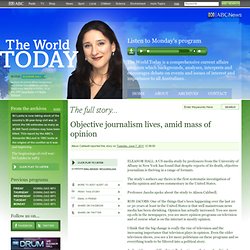
The study's authors say theirs is the first systematic investigation of media opinion and news commentary in the United States. Professor Jacobs spoke about the study to Alison Caldwell. Is there still a place for objective journalism – or is it an anachronism? Center for American Progress/Flickr (cc by_nc_nd) Eric Alterman contends that journalists should admit their biases and embrace partiality.
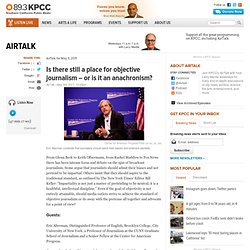
From Glenn Beck to Keith Olbermann, from Rachel Maddow to Fox News there has been intense focus and debate on the spin of broadcast journalism. Some argue that journalists should admit their biases and not pretend to be impartial. Others insist that they should aspire to the traditional standard, as outlined by The New York Times' Editor Bill Keller: "Impartiality is not just a matter of pretending to be neutral; it is a healthful, intellectual discipline. " Who Betrayed Objective Journalism? The mainstream U.S. news media often laments the decline of objective journalism, pointing disapprovingly at the more subjective news that comes from the Internet or from ideological programming whether Fox News on the Right or some MSNBC hosts on the Left.
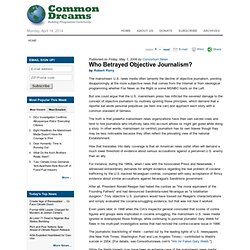
But one could argue that the U.S. mainstream press has inflicted the severest damage to the concept of objective journalism by routinely ignoring those principles, which demand that a reporter set aside personal prejudices (as best one can) and approach each story with a common standard of fairness. The truth is that powerful mainstream news organizations have their own sacred cows and tend to hire journalists who intuitively take into account whose ox might get gored while doing a story. In other words, mainstream (or centrist) journalism has its own biases though they may be less noticeable because they often reflect the prevailing view of the national Establishment. The Hariri Example. Rethinking Objective Journalism. July 8, 2003 | Like this article?
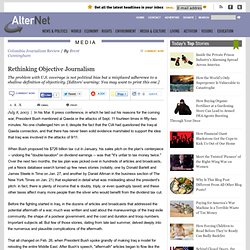
Join our email list: Stay up to date with the latest headlines via email. In his Mar. 6 press conference, in which he laid out his reasons for the coming war, President Bush mentioned al Qaeda or the attacks of Sept. 11 fourteen times in fifty-two minutes. No one challenged him on it, despite the fact that the CIA had questioned the Iraq-al Qaeda connection, and that there has never been solid evidence marshaled to support the idea that Iraq was involved in the attacks of 9/11. Journalism after September 11 - Barbie Zelizer, Stuart Allan. Just the Facts: How "Objectivity ... - David T. Z. Mindich. Chet Huntley talks about journalistic objectivity. The Future of News: The Role of Citizen Journalists (Page) The Myth of Objective Journalism. Whoops! In 2008, talk show host Sean Hannity declared, “Journalism (the unbiased reporting of the facts) in America is Dead.”
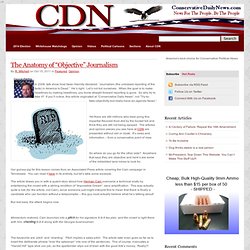
He’s right. Let’s not kid ourselves. When the goal is to make headlines by making headlines, you know straight forward reporting is gone. Julian Dunn's Journal » Disclosure: The New Objectivity in Journalism. Yesterday evening, a few of my CUNY journalism school classmates and I attended a lecture by Brooke Gladstone, host of WNYC‘s excellent media-analysis program, On The Media.
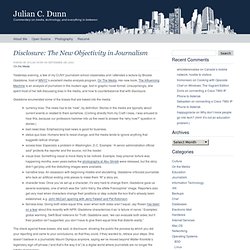
Her new book, The Influencing Machine is an analysis of journalism in the modern age, told in graphic novel format. Unsurprisingly, she spent most of her talk discussing bias in the media, and how to counterbalance that with disclosure. Objectivity & Balance: Today's Best Practices in American Journalism. News Bias Explored. Are Journalists really objective?
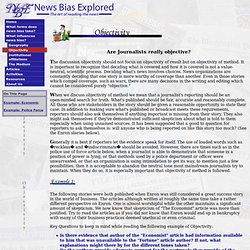
The discussion objectivity should not focus on objectivity of result but on objectivity of method. It is important to recognize that deciding what is covered and how it is covered is not a value-neutral, scientific process. Deciding what's news involves choices. News organizations are constantly deciding that one story is more worthy of coverage than another.
Even in those stories which compel coverage, such as wars, there are many decisions in the writing and editing which cannot be considered purely "objective. " Objectivity and Fairness - Objectivity and fairness in news stories. You hear it all the time – reporters should be objective and fair.
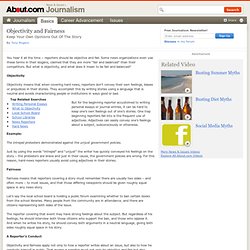
Some news organizations even use these terms in their slogans, claimed that they are more “fair and balanced” than their competitors. But what is objectivity, and what does it mean to be fair and balanced? UNT talk-Objectivity in Journalism. University of North Texas Nature Writing Symposium talk: “Changing the World One Story at a Time” April 2007 Copyright © 2007 Wendee Holtcamp – bohemian@wendeeholtcamp.com Suppose you are given a bucket of water.
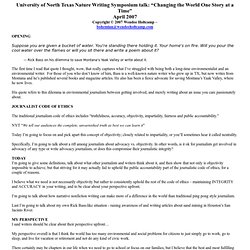
You're standing there holding it. -- Rick Bass on his dilemma to save Montana's Yaak Valley or write about it. The first time I read that quote I thought, wow, that really captures what I’ve struggled with being both a long-time environmentalist and an environmental writer. His quote refers to this dilemma in environmental journalism between getting involved, and merely writing about an issue you care passionately about. The traditional journalism code of ethics includes “truthfulness, accuracy, objectivity, impartiality, fairness and public accountability.”
NYT “We tell our audiences the complete, unvarnished truth as best we can learn it” Specifically, I’m going to talk about a rift among journalists about advocacy vs. objectivity. “But now, says the Once-ler, Now that you´re here, Objectivity in Journalism. DAVID BROOKS There is some dispute about whether objectivity can really exist.
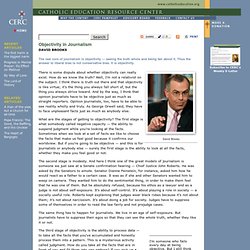
How do we know the truth? Well, I’m not a relativist on the subject. I think there is truth out there and that objectivity is like virtue; it's the thing you always fall short of, but the thing you always strive toward. And by the way, I think that opinion journalists have to be objective just as much as straight reporters. Opinion journalists, too, have to be able to see reality wholly and truly. The Myth of Objectivity in Journalism.
Rethinking Journalism Ethics, Objectivity in the Age of Social Media. In response to the rapidly changing media environment, many schools and academic programs are offering novel approaches to journalism education. This seismic change creates tensions within programs, especially when it comes to how to teach ethics for this increasingly mixed media. In an earlier column, I put forward some principles for teaching ethics amid this media revolution. But these principles do not address some specific problems.
Whither objectivity? Today, students don’t just learn how to report straight news on deadline. Questioning Journalistic Objectivity. Journalism, as we've known it, has been mourned deeply over the last few years. The Internet has changed everything. "Citizen journalism," a phrase that still inspires dirty looks at most journalism conferences, has blurred the lines between objectivity and subjectivity, paid and unpaid labor, news and opinion.
It gives veteran journalists agita to imagine totally untrained people messing around in their exclusive, albeit hardscrabble, club. With all this reshaping and shifting of our industry, all this talk about changing financial models and publishing structures, now is an opportune time to question one of the field's most defended values: objectivity. This issue has been particularly present for me as I'm on the final stages of writing a book -- a collection of profiles of ten people under 35 who are doing interesting social justice work. And I told them that I would show them drafts and give them a chance to give me feedback and correct inaccuracies before the pieces become public. Public Journalism and the Problem of Objectivity.